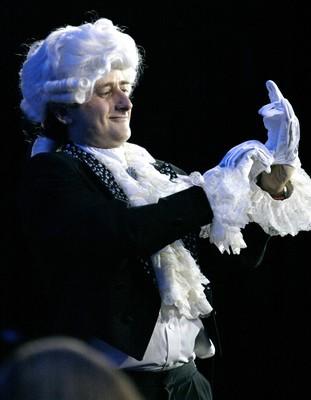CONDUCT UNBECOMING – Off-key (Conductor)



Before conducting the Las Vegas Philharmonic through "King Cotton March" by John Philip Sousa, I razzed the man gracious enough to pass me his baton.
"If I do a great job," I asked David Itkin in front of about 2,000 concertgoers gathered for the orchestra’s annual Fourth of July "Star Spangled Spectacular" at Hills Park, "then what does that say about what you do?"
A conductor’s job, Itkin told me earlier in the week, is to breathe life into the classical music on the page.
"You take that algorithm the composer wrote and turn it into something that gets the musicians and the audience excited," he said.
Itkin — an Oregon native who has conducted more than 2,000 concerts — conducted his first at the unheard-of age of 16. He had been a percussionist at the Portland Civic Theater when the regular conductor quit.
"It was, I think in large part, a fiscally viable option to let me try," he said. "My conducting experience to that point was about 15 minutes, once, in front of my high school orchestra."
That’s still 15 minutes more than my conducting experience. I can barely conduct myself. Oh, and did I mention that I had never heard "King Cotton March" before?
"I was told that a recording got provided for you," Itkin said. "But I’m new." (It’s his first performance with the Las Vegas Philharmonic, too, as its new music director.)
"Do you read music?" Itkin asked me.
I didn’t technically lie. However, I omitted the fact that I require 20 seconds to determine each note using the "Every Good Boy Deserves French Fries" decoding system.
"Good, then you can use this to tell where you are," he said, handing me a ream of paper even less comprehensible than the rulebook for my homeowner association.
No degree is required to conduct an orchestra.
"But it’s a way to get some nice training and some credibility," Itkin said, adding that, before he enrolled in the conducting program at Indiana University, "I was never going to get an audition for anything — even something really awful."
Conductors of small orchestras start at about $30,000 a year; veteran music directors in the big cities pull seven figures.
"Would you like to know which one I’m closer to?" asked Itkin, who also somehow finds the time to conduct the Arkansas Symphony and Abilene (Texas) Philharmonic. (After I replied in the affirmative, he explained that the question was rhetorical.)
According to Itkin, it’s a conductor’s job to make "thousands of artistic decisions per hour" about how a piece will be played. Those decisions involve dynamics, articulation and tempo. It is up to a conductor how fast "allegro" means, for instance, and how loudly each instrument needs to play.
For me, however, Itkin chose a number requiring only one basic decision: how to start. Sousa marches are renown for their utter simplicity.
"A decent orchestra can do this if you shoot a gun and walk away," Itkin admitted.
Even so, starting could be enough of a problem for me.
"That ain’t the way," Itkin said as I tapped the baton. "Only in cartoons."
He caught me. Bugs Bunny is the only conductor I’m familiar with. In both "Long-Haired Hare" and "Baton Bunny," he helmed what appeared to be the Hollywood Bowl Orchestra as wackiness ensued.
"It’s George Washington!" screams a young boy tugging at his father’s leg as I strut toward the amphitheater stage in a tux and powdered wig provided by Imagination Costume. (You can pretty much tell how unprepared I feel for a job by how overdressed I show up.)
As per my training, I lock eyes with the drum section, count one measure and launch with an upswing.
"King Cotton March" sounds to me like the theme to "Monty Python’s Flying Circus." So I conduct as though it were, my right hand keeping time and my left swinging wildly to command instrumentation that exists only in the other song. (Sousa actually wrote both pieces, I discover later. The Python theme is properly titled "The Liberty Bell.")
"I’ll let you in on a little secret," Itkin told me onstage beforehand. "They’re not actually watching anyway."
He was right. I’m keeping up with them. Only about 25 of the 75 musicians under my alleged command look my way during the performance — most are giggling, a smattering seem deeply unamused. Violinist Shakeh Ghoukasian stares at her music as I pretend to scold her for playing wrong (as though I could tell). She doesn’t see the projectile that sails past her left eyeball, either. It’s my baton.
I know I’ll be accused of botching up on purpose. I usually am. But the fault this time lies with my white gloves, which I slowly slinked into while keeping the musicians, and crowd, playfully waiting. (If only they were good for as much friction as laughter.)
Itkin never had anything to worry about as far as my doing a great job — although possible damage to his baton is another issue. (The 12-inch Mollard was passed to him during a special ceremony on June 1.)
"That’s why I went to college for nine years," Itkin gets the last razz in after the end of both the song and my conducting career, "to learn not to drop (the baton) during the performance."
Watch video of Levitan conducting the Las Vegas Philharmonic at www.reviewjournal.com/video/fearandloafing.html. Fear and Loafing runs on Mondays in the Living section. Levitan’s previous adventures are posted at fearandloafing.com.
COREY LEVITANFEAR AND LOAFINGWatch Video












